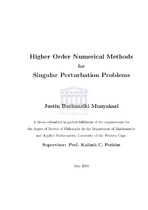Higher order numerical methods for singular perturbation problems
Abstract
In recent years, there has been a great interest towards the higher order numerical methods for singularly perturbed problems. As compared to their lower order counterparts, they provide better accuracy with fewer mesh points. Construction and/or implementation of direct higher order methods is usually very complicated. Thus a natural choice is to use some convergence acceleration techniques, e.g., Richardson extrapolation, defect correction, etc. In this thesis, we will consider various classes of problems described by singularly perturbed ordinary and partial differential equations. For these problems, we design some novel numerical methods and attempt to increase their accuracy as well as the order of convergence. We also do the same for existing numerical methods in some instances. We find that, even though the Richardson extrapolation technique always improves the accuracy, it does not perform equally well when applied to different methods for certain classes of problems. Moreover, while in some cases it improves the order of convergence, in other cases it does not. These issues are discussed in this thesis for linear and nonlinear singularly perturbed ODEs as well as PDEs. Extrapolation techniques are analyzed thoroughly in all the cases, whereas the limitations of the defect correction approach for certain problems is indicated at the end of the thesis.
Collections
Related items
Showing items related by title, author, creator and subject.
-
Some non-standard statistical dependence problems
Bere, Alphonce (University of the Western Cape, 2016)The major result of this thesis is the development of a framework for the application of pair-mixtures of copulas to model asymmetric dependencies in bivariate data. The main motivation is the inadequacy of mixtures of ... -
Perceptions of clinical psychologists working in low income, high violence communities in Cape Town: Exploring the link between infant-caregiver attachment and the development of internalizing problems in children
Paget, Alexandra (University of the Western Cape, 2017)Given that numerous research studies have established the important role that attachment plays in the development of internalizing disorders in children, it is important to ensure that the clinical psychologists working ... -
Young adults' experiences of providing social support to a parent with alcohol abuse problems
Da Mota Ribeiro, Jezebel (University of the Western Cape, 2016)Supportive relationships have been found to be very beneficial for health and well-being. However, amongst alcohol dependent individuals, family support is often low, as alcohol abuse can pose a barrier between the individual ...



